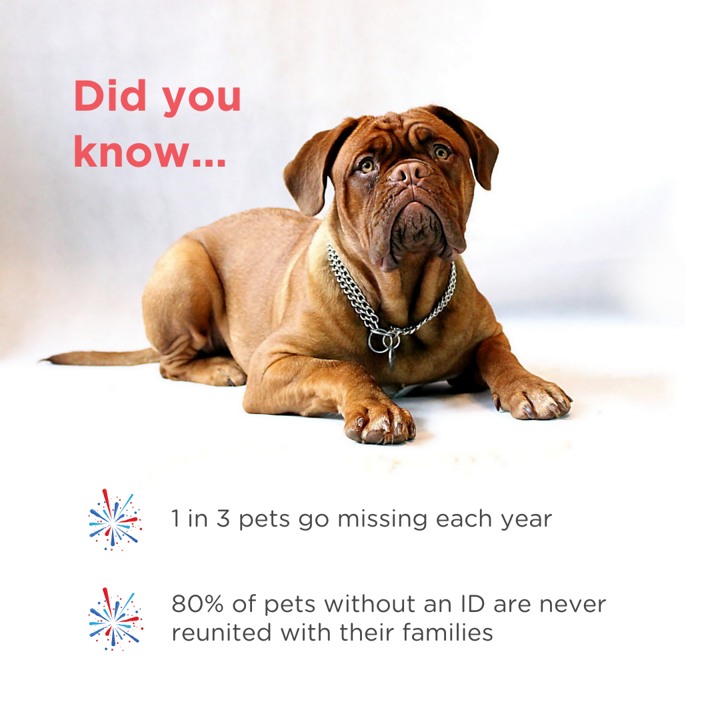With Independence Day right around the corner, now is the time to secure that loose fence, refill the anxiety prescription, and if you haven’t already, get your pets microchipped!
Did you know that June is National Microchipping Month, and July is Lost Pet Prevention Month? The two go hand in hand, especially this time of year with 4th of July fireworks, when pets may get spooked and run off!

Microchips can save lives and reunite pets with their families in the unfortunate event that they are lost. Each year, 1 in 3 pets go missing – without an ID, 80% of missing pets never find their way home and often end up in shelters to be adopted. Unfortunately for some, they may never see that day.
Microchipping is an easy and permanent way to identify pets, and it’s no more painful than a regular vaccine. Some microchips even allow you to store medical information which may be crucial if your lost pet needs medical attention. Most shelters, animal rescues, and veterinary hospitals have microchip readers and a standard protocol to scan any pets that have been found and brought to them.
Once your pet has been microchipped, it’s important to register the microchip and keep your contact information up-to-date with the manufacturer. It’s also a good idea to have your vet check that the chip is functioning properly at your pet’s annual exam. You can access this universal microchip database to identify the registry that has your pet’s information.
While we wish microchipping could prevent pets from getting lost in the first place, sadly, that’s not the case! But here are a few suggestions that might help:
1. Crate training & leashing your dog
Once trained, many dogs find a crate to be a safe space where they can feel comfortable and at ease. When a stressful situation arises, a crate is a great tool to help calm your dog. If your dog can’t be crated, leash them when circumstances call for it. Even dogs with the best recall may not come when they are spooked by loud noises, like fireworks for example. Leashing your dog when they are not in an enclosed space is the safest way to prevent your dog from taking off and possibly getting lost or hurting themselves.
2. Teach recall
This is one of the most important things you can teach a dog, which can – among other things – reduce the likelihood of them running off and getting lost. You can work on recall whether you’re hanging out in your backyard or at a park, so when a distraction arises, they can focus on you, instead of the tantalizing squirrel.
3. Secure your yard and home
Now is the time to fix that rickety fence or busted screen door. One of the most common ways a dog gets lost is when they escape their yard. Too often dogs are mistaken as a stray in their own neighborhood when really, they just escaped the safety of their nearby backyard.
4. Spay or neuter
Sometimes natural instinct takes over and dogs are drawn to one another. When male dogs aren’t neutered, they have a higher tendency to sneak out and find females, especially when the latter are in heat. Neutering or spaying your dog takes away this instinct so that’s one less reason why your dog might escape.
5. Keep information readily available
You should have all your pet’s documents and papers organized in one area with easy access in case of an emergency. If your pet is in the care of others like a dog walker or groomer, make sure they have that information too. If your pet care professional uses software like PetPocketbook to keep their client information organized, take time to fill out your pets’ medical information including their microchip number and vet information.
Have a safe and fun 4th of July! 🎇
